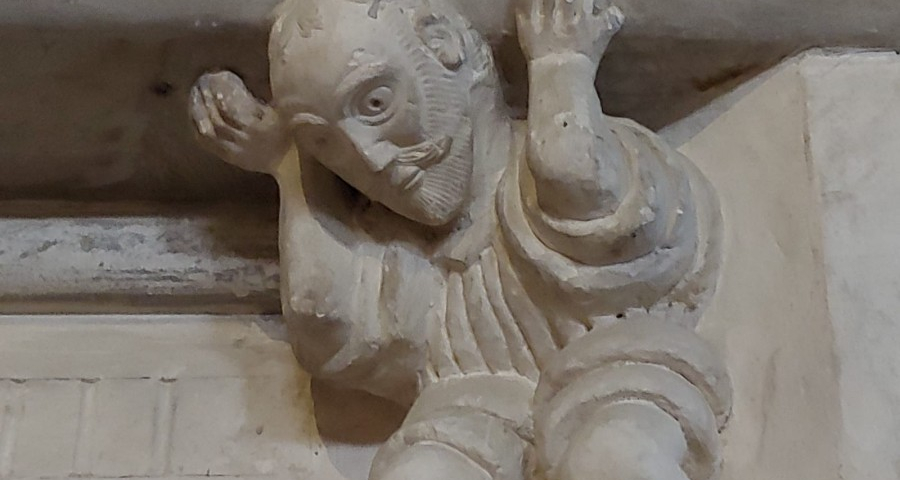The exile and the promise / 21 - It is the extraordinary alchemy of the Spirit that turns stone into flesh
by Luigino Bruni
Published in Avvenire 31/03/2019
«And My soul became afflicted for the sons of men, because they are blind in their hearts and do not have sight; for empty they came into the world, and empty too they seek to leave the world»
The Gospel of Thomas
A child learning new words is one of the most beautiful spectacles on earth. Within a few weeks, their vocabulary explodes, and the few words of the first two years of life multiply, becoming hundreds and then thousands. Each day brings the gift of new words to learn, which the child learns all at once. Once you become an adult, however, you only re-learn new words one at a time, when an encounter, an illness, or a great crisis becomes the midwife of new words being born. Suddenly the sound of a word pronounced thousands of times becomes that word made flesh. Who knows what Abraham knew about the word altar until a child stretched out on it; or what Moses thought of the sea before seeing it part before his eyes. He grew up surrounded by the wood in his father's workshop, but perhaps Jesus only really understood the meaning of the word wood in Golgotha. The Bible is also a great map for finding your way around the universe and the mystery of the Word and of words. Many people, after decades of spiritual and moral mutism, all of a sudden one day find it and learn to speak again, and with the help of those donated words began to pray, without even realizing it.
Some biblical words are so central and telling that they represent ideal books within the Book. We could narrate the Bible by looking at its story through bread, children, water, pain, and mothers. Or by pursuing the various declensions and meanings of the word heart.
Leb (or Lebab) appears about a thousand times in the Bible, more than eight hundred times in the Old Testament. A word that, like all great words from beginning to end, brings a radical ambivalence with it. A poised heart never gives in to sentimentalism, and even when it works as an image of feelings, the word remains serious and sober as the very life it symbolizes the most. And so, the first time we encounter it, it is within a very tragic context, nestled between Cain and Noah, at the center of humanity's first dark night, which will then culminate in the flood: «The Lord saw… that every inclination of the thoughts of the human heart was only evil all the time» (Genesis 6,5). And makes its last appearance in the book of Revelation, still within a dark and threatening context, in the angel's dialogues with the woman and the beast (Revelation 17,3-17).
But in Exodus the heart is also the place where God infuses inspiration, where the creativity of art is born: «And in the hearts of all that are wise hearted I have put wisdom, that they may make all that I have commanded thee» (Exodus 31,6). The whole Law of Moses is then a matter of the heart: «Love the Lord your God with all your heart and with all your soul and with all your strength» (Deuteronomy 6,5). The harshness of the heart of the Israelites is a great prophetic theme, but an even greater one is constituted by the invocation in Jeremiah’s heart, in its most terrible vocational crisis: «But if I say, “I will not mention his word or speak anymore in his name,” his word is in my heart like a fire» (Jeremiah 20,9). No place is deeper or more profound than the place that harbors the voice that calls by name, and there is no better word than leb-heart to indicate this profound depth. Then there is the fact that there is also a special relationship between women and the heart. In order to explain where the exultation of the spirit lies, Anna evokes the heart in her Magnificat: «My heart rejoices in the Lord» (1 Samuel 2,1). And the heart continues to occupy the center in the New Testament as well: it burns within the disciples of Emmaus, it is at the center of a beautiful bliss, and it is the house that Mary guards.
Among the many stupendous passages in which the Bible has explained the semantics of the word heart to us, however, Ezekiel's song stands out above them all. We find ourselves in exile; Jerusalem has been destroyed along with its temple. The people of Israel find themselves immersed in total desolation and failure, which Ezekiel interprets as the culmination of a long history of perversion and infidelity that began when the people were still enslaved in Egypt and then continued for over five centuries in the promised land (Ezekiel 36,17). Hence, this chapter by Ezekiel on the "new heart" comes after a thousand idolatries, after repeated worshipping in the wrong sanctuaries, after all the burnt offerings of children and all the numerous orgies with the sacred prostitutes of the Canaanite heights. Not to mention, all the illusions of the false prophets and the derision and the mockery that the prophet had been subjected to in the early years of his preaching, only for having publicly denounced the corruption of his community. Ezekiel’s song resonates in this lost paradise, within the broken alliance and the betrayed Covenant, in this long eclipse of the Promise, and acquires color, meaning and strength from this varied landscape.
If we wish to understand anything of this song, we must try to put ourselves in the same moral and theological desert, sit down next to Ezekiel and listen to his words from his lookout post, intercepting them in the midst of the deafening noise of the Egyptian, Canaanite and Babylonian gods. We should then try to listen to his psalm as if we had never heard it before, as if it was being announced to us for the first time; as if we were just born today, entirely ignorant of the Bible and of words. Listening to him sitting on the rubble of the infinite idolatries of our time, on the silence of our defeated God, in the midst of the deafening noise of the religious chatter of our low-end spiritualities. It is only by listening within this anthropological and theological need, that Ezekiel's chanting words can still retain today an echo of the force with which his first words came to the exiles, hearing them for the first time along the rivers of Babylon. Any reading of the Bible will not leave us unscathed if we only recreate the same miracle of the first listening: «For I will take you out of the nations; I will gather you from all the countries and bring you back into your own land. I will sprinkle clean water on you, and you will be clean; I will cleanse you from all your impurities and from all your idols» (Ezekiel 36,24-25). Return to the homeland and purification from all idols and contaminations. To so much literature and theology, these two verses would be enough to indicate the great light that awaits the people still immersed in darkness. However, not to Ezekiel. He wishes to tell us something extremely important to enable us to understand the logic of returning.
He wants us to know that in order to end an exile going home is not enough. Even on that great day of returning home - and that anonymous prophet and poet, we know as the "third Isaiah", will repeat it to us later with extraordinary force - the people returned home will continue their infidelity, unless something much more important happens than a mere material return. You always return worse off than you left after an exile, if the return does not become a new exodus towards a new promised land.
This is why purification rites are not enough to start over after a deportation. After a long illness, it is not enough to go back to the hairdresser, to buy a nice new dress, or maybe go to confession, invite all friends for dinner and become new "on the outside". All this is important and in many cases, it is also necessary; but in order to really to start over, we need something different and deeper: we need another promised land, a new calling, a new great dream. And to tell us all this, Ezekiel does not find a more suitable image than that of the "new heart", with which he composes one of the most beautiful and sublime verses in the Bible and in all the sacred literature of all times. Here it is: « I will give you a new heart and put a new spirit in you; I will remove from you your heart of stone and give you a heart of flesh» (Ezekiel 36,26).
Words that take your breath away, which immediately become prayer because they make us exclaim: "Oh, what desire and longing for this new heart: so be it, amen, amen. For us, for me, for our children, for all those we love". The good news is that these intimate and secret conversions (the heart is invisible from the outside) sometimes really happen. They are very rare, but they happen. We should not leave this earth without having experienced it at least once - within ourselves, or, of equal importance, having observed it in a child of ours or in a friend. They happen after repeatedly trying to change our lives in vain, after making a hundred promises to others and ourselves and failing all of them. Then, comes a different day and the "heart" really changes. It is an altogether unexpected, unscheduled day, a perfectly normal and ordinary day in general. It does not come as a result of our commitment and our virtues, but when we are weak enough not to oppose resistance to the normal flow of life. We did not expect him, yet he arrived. We did not recognize him as he arrived; only at the end of the nighttime struggle did he reveal his name to us, while changing ours forever. Because the truly decisive events in our existence do not come as a reward for our commitment, we do not build them, they are merely and simply a gift. Too often, we fail to notice how much grace fills our lives because we are too busy deserving our achievements - and so there is no room for Providence to enter and reach our heart on our wall of merits. That is why Ezekiel tells us that this alchemy of the dead and hard stone turning into living and soft flesh is a work of the Spirit, and we will see this further in the great chapter on the dried up bones.
The last part of this great chapter is also very suggestive and revealing: «I will call for the grain and make it plentiful and will not bring famine upon you. I will increase the fruit of the trees and the crops of the field, so that you will no longer suffer disgrace among the nations because of famine» (Ezekiel 36,29-30). Hunger is a source of shame. A phrase that we should post at the entrance of every institution and organization working with human development.
The language of economics and prosperity makes a reappearance to express blessings and a new life. By now, we know it: the prophets only have the words of life to their disposal to speak of God, because they are much more secular than we are. Hence, work also returns: «The desolate land will be cultivated instead of lying desolate in the sight of all who pass through it. They will say, “This land that was laid waste has become like the garden of Eden”» (Ezekiel 36,34-35). It is not uncommon for us to realize that we have received a new heart when we start working again. We go back to work as usual, and once we are there, we feel that something profound has changed, but we did not know it before going back to the office or the factory. Work is also all of this.
Download pdf article in pdf (250 KB)













